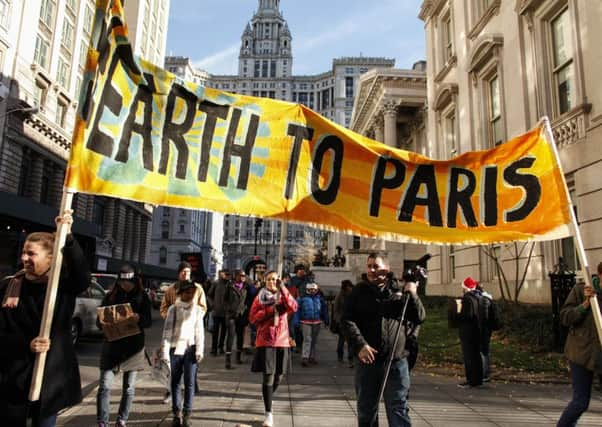Leaders: 11 days to save the world – and we must


The next 11 days will be crucial in the fight against what is widely said to be the greatest threat humanity has ever faced, and which it has inflicted upon itself – man-made climate change.
So it is encouraging that this week more than 150 world leaders joined top scientists and environmentalists in Paris to open key talks aimed at limiting global warming and avoiding its most catastrophic effects.
Advertisement
Hide AdAdvertisement
Hide AdHeads of the planet’s biggest polluters turned up to pledge their commitment.
US President Barack Obama said the United Nations conference could prove a “turning point”, urging negotiators to deliver a meaningful deal.
Even Russian premier Vladimir Putin and China’s Xi Jinping agreed the importance of hammering out a resolution on cutting greenhouse gas emissions, with the latter proclaiming the fight against climate change as “a shared mission for all mankind”.
So it appears that political differences appear to have been set aside as superpowers and developing nations sit down together at the negotiating table with an internationally agreed common goal – to keep the global temperature from rising more than 2C above pre-industrial levels. All well and good.
Some bad news is that we are already halfway there, with meteorologists warning that this year will see average temperatures more than 1C higher than in the 1850s.
So while it is commendable that we have finally achieved widespread acknowledgement that climate change is actually happening, the pace of action to combat that change is frustratingly slow. Progress towards achieving any emissions goals has been tortuous, and the latest talks are unlikely to change that. It has not yet been agreed how to share out the $100 billion in support for poor countries dealing with climate change that was promised at the UN meeting in Copenhagen six years ago.
We cannot and should not sit back fiddling while the planet faces rising sea levels, increasingly severe weather, animal extinctions and human starvation and loss of habitat.
So the speed of change needs to pick up and the world leaders gathered currently in Paris, the biggest gathering of such leaders ever, have some very big but some very fundamental decisions to make. The first must be to dismiss any idea that the big developing nations like China and India are given more leeway that the developed nations who have already created their economies and polluted along the way. It is easy to understand their argument but the fact is that the knowledge of what environmental legacy that industrial growth would leave is relatively new. But anyway, the idea that it is the developing countries turn to pollute on the way to riches is preposterous.
Advertisement
Hide AdAdvertisement
Hide AdTo use a business cliche, we (that is the world) are where we are and we have to act. This conference must realise that it needs to just not talk about a plan for change but must also come up for one that will effect real change and then put in a mechanism for its timely delivery. It would appear from all the fine speeches that the political will is there. So this conference must end in concerted action.
Airstrikes U-turn is end for Corbyn
Oh dear. Jeremy Corbyn may as well get his coat and start packing up his boxes now. It’s all over bar the shouting.
The Labour leader has garnered much respect, though sometimes grudging, for his dogged determination to stick to his beliefs. As a committed pacifist, he had resolutely condemned plans by David Cameron for the UK to join the bombing campaign in Syria aimed at wiping out Islamic State militants.
Mr Corbyn had wanted his party to fall into line and adopt a united policy of opposition to air strikes, but the Islington North MP has now been forced to back down after an internal tussle in which he received what has been described as a “thorough kicking” from his shadow cabinet.
He has announced he will, after all, allow his MPs a free vote on the subjects. This turnaround is a serious setback for Mr Corbyn, and one that is likely to prove his undoing.
With the Prime Minister having called a one-day debate and vote tomorrow to seek the green light for the UK to extend airstrikes from Iraq to Syria, he still needs the support of opposition MPs if he is to succeed.
Three-quarters of Labour Party members were said to agree with Mr Corbyn’s position, and he could have forced his MPs into alignment.
But threats of resignations from his front bench have caused a climb-down, though the Labour leader has called for a two-day debate in the House of Commons before the vote is held.
Advertisement
Hide AdAdvertisement
Hide AdThese latest events amount to a damaging failure for Mr Corbyn and a defining moment for Labour – he has failed to lead his party, failed to take it back to its roots and failed to make it look fit for government.
As we wait for the inevitable, the only real questions that remain to be answered are how long he will last and who will replace him.